BLACK ALUMNI ASSOCIATION NEWSLETTER: February 2024
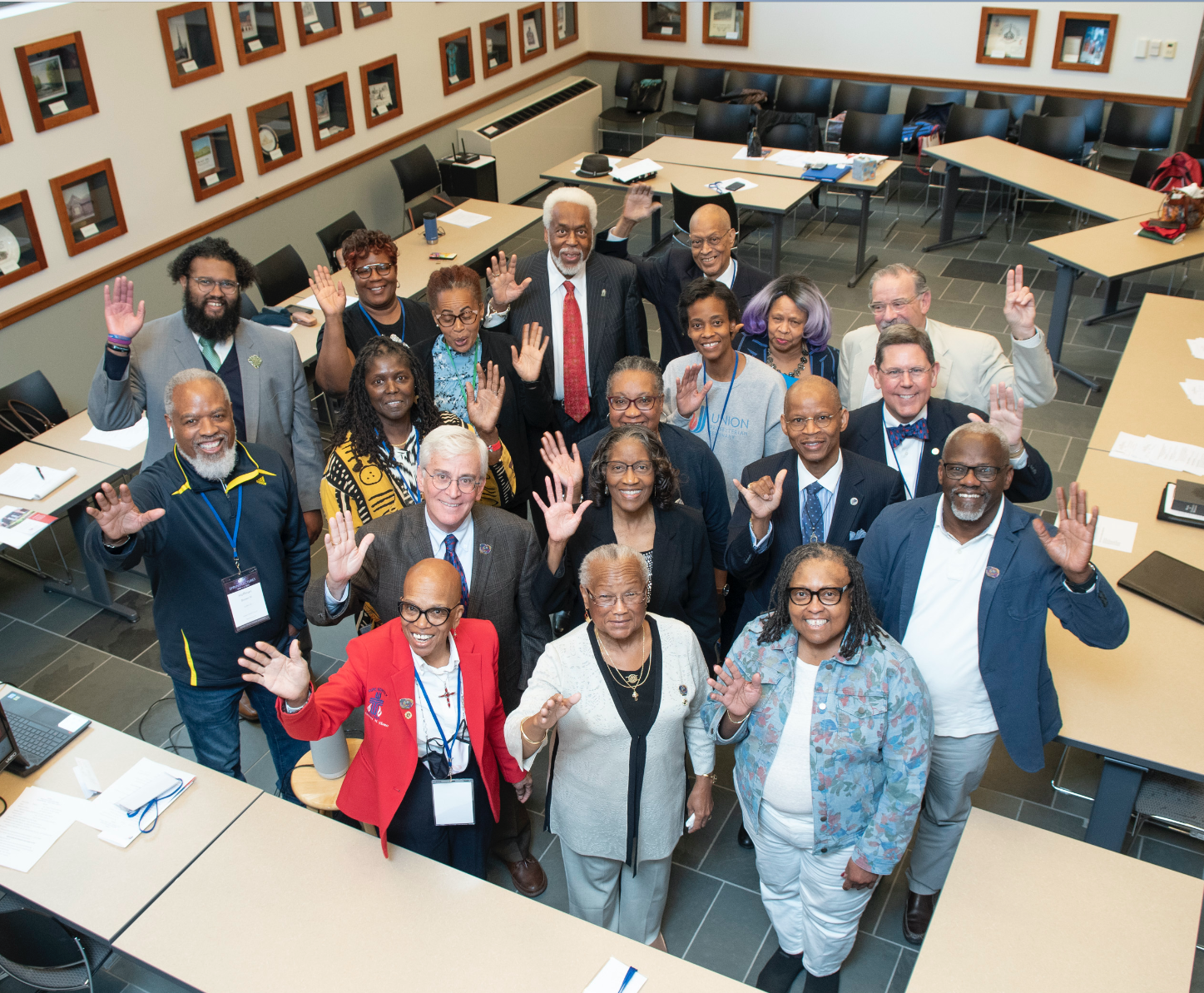
Greetings, Union Presbyterian Seminary (UPSem) Alums!
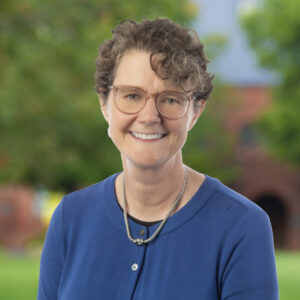
Dr. Jacqueline Lapsley
I am grateful for the invitation to contribute to this issue of the Black Alumni Association Newsletter, in which I will offer a few reflections from my first six months in office. Before I name them, one thing stands out above all: it’s been a joy to come into the UPSem community, a warm and vibrant community called to serve Christ and the church for the sake of the world. One example of that has been the gracious welcome I have received specifically from the Black Alumni Association – I am so grateful!
Other reflections upon entering the UPSem community:
1) Union’s commitment to congregations and to forming pastoral leaders for congregations is impressive. I’ve been in theological education a long time and I can say that our relationships with congregations are very strong, indeed.
2) We have a wonderful and increasingly diverse faculty, some of the finest educators anywhere, whose teaching can change and is changing the world. Their expertise and their dedication to their students is inspiring. Diversifying our faculty, student body, and staff will continue to be a priority in the years to come, as well as ensuring that everyone at Union feels a powerful sense of belonging.
3) We have a dedicated board and a great team of staff committed to the mission of UPSem. People come to work at Union, and they work hard, because they care about the mission.
4) Union has been doing a wonderful job of living into its mission of forming leaders for congregations and other ministries, AND there is so much more we can do. More we can do to maximize the impact of the excellent theological education we offer. We can reach more people, educate more leaders for ministry, and we can enhance the ways we prepare those leaders for the church and the world of the future. We are in the midst of strategic planning for the next five years so you will hear more about initiatives around these ideas in the next few months.
I believe the time is now to refocus our attention on the boundless opportunities that God has set before us. We are stewards of a great gift that the world urgently still needs today: a compassionate and joyful gospel that leads to newness of life and flourishing for all humanity and all creation. More than ever we are called to proclaim that gospel in new and creative ways. I am grateful to you, the members of the Black Alumni Association, for your partnership in that holy work for the sake of the church and the world that God so loves.
Faithfully,
Jacq Lapsley, President
Poem of Sending
By Elder Donna A. Graves
Eastern Virginia Presbytery Candidate for Ministry (PCUSA)
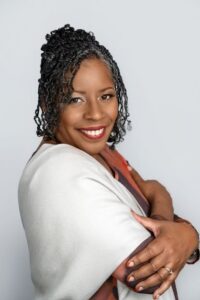
Donna Graves
In the shadows of history, a question persists, whispers of prophets, have you been missed? Elijah on Horeb, feeling alone, A plea to the heavens, a heart-wrenching moan.
In the tapestry woven by struggle and strife, a call echoes forth, awakening life. Black woman standing, shoulders strong, the legacy of kings, the rhythm of a song.
Is it you, in the silence profound? The next great prophet, in your heart, is found. The spirit of justice, a flame burning bright, in the depths of the struggle, a guiding light.
Resilience wrapped in melanin’s embrace, strength in the struggle, the beauty of grace. The call to prophetic, in the air it weaves, from ancestors’ whispers, the heart retrieves.
Is it me? Is it you? Is it us, in this space? Prophetic voices, an empowered embrace. Not on a mountaintop, distant and far, but, rising as one, like the North Star.
A Black woman’s perspective, a powerful view, carrying, stories, dreams, and struggles anew. The challenge accepted, the call to proclaim, in the face of injustice, to change the game.
So, in response to history’s resounding plea, “Yes, it could be me. It could be you. It could be we.” United in purpose, in justice we trust, the next generations of prophets, rising from dust.
The legacy of Martin Luther King, Jr. challenging us to step into the void he left behind. The struggle for justice and equality continues, and the call for prophets who will speak truth to power persists.
And so, with hearts on fire and voices clear, let this charge be heard, discard every fear. In the footsteps of giants, we boldly trod, for justice, equality, let us rise, O kindred souls and march on till victory is won!
Black Lives Matter: African American Politicians Who Became Governors!
By Rev. William R. Freeman
M.Div., Union-PSCE ‘01
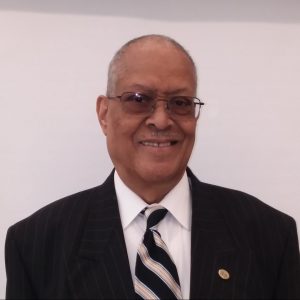
Rev. William Freeman
Just before Christmas 2023, while watching a news broadcast, I was introduced to a person I had never heard of, a Mr. Garlin Gilchrist, the Lieutenant Governor of the state of Michigan. That got me to thinking of this question: “How many African American Lieutenant Governors have there been, and how many of those have gone on to become Governor?” Well, my Google research shows that the total number of past and present African American Lieutenant Governors is thirty-five (35), of whom only two (2), L. Douglas Wilder, and Deval L. Patrick have been elected Governors by the constituents of their respective states, the Commonwealth of Virginia and the Commonwealth of Massachusetts respectively. The Honorable L. Douglas Wilder served as governor from January 13, 1990 to January 15, 1994, one term, as prescribed by Virginia State law and The Honorable Deval L. Patrick served from January 4, 2007 to January 11, 2015, two terms by state law.
However, Governor Wilder, who is presently in his mid 90’s, still remains one of the most powerful voices in Virginia politics.
On November 8, 2022 a third African American, Wes Moore, although not previously a lieutenant governor, joined Governors Wilder and Patrick by being elected governor by the voters in the State of Maryland. Now, you might say, there have been other African Americans who have been elevated to Governor, and you are correct. However, the operative word here is “ELECTED.” Three (3) additional lieutenant governors have also become governors but that has been due to the office of governor being vacated for various reasons: the elected governor dying while still serving, illness or injury, being accused and/or convicted of a crime while serving in office or resignation. There have been three (3) African American lieutenant governors who have become governor via these methods. During Reconstruction, The Honorable Oscar James Dunn, the first Black elected lieutenant governor was also the first acting governor of a U. S. State who was elevated to become governor of the State of Louisiana when Governor Henry Clay Warmouth was injured in 1871. Also during Reconstruction, Pinckney Benton Stewart Pinchback known as P. B. S. Pinchback became the second African American elected to serve as lieutenant governor of Louisiana. He was also elevated to Governor upon the death of Governor Dunn and served as Acting Governor from December 9, 1872 to January 13, 1873.
Most recently, The Honorable David A. Paterson was elevated to governor of the State of New York, serving from March 17, 2008 to December 31, 2010 succeeding Governor Eliot Laurence Spitzer who resigned after it was uncovered that he patronized a prostitution ring. As you can see, as of this writing in February, 2024, the list of African Americans who have been elected or elevated to governor is very small, six (6) to be exact; not because of qualifications, but due to racism. However, just like white America pushed the idea that Blacks did not have the ability to become successful baseball players; or are not smart enough to play the quarterback position on college or professional football teams, or integrate colleges, or play on college basketball and other sports teams. This author asks you, the readers of this BAA Black History Month newsletter, to look at the composition of today’s baseball, basketball, and football teams such as the Boston Red Sox; New York Yankees; Atlanta Braves; Kentucky Wildcats; Alabama Crimson Tide; Clemson Tigers; South Carolina Gamecocks; Ole Mississippi Rebels; Tennessee Volunteers, Georgia Bulldogs, Virginia Cavaliers to name a few. I venture to say without Black athletes, colleges and professional sports nationwide, would not be the same! Nor would national, state and local governments!
The good news is that at present, there are eight (8) African American men AND women serving as Lieutenant Governors. I pray that they will aspire to join the ranks of the six (6) lieutenant governors who became governors identified in previous paragraphs. They are: Austin Davis – Pennsylvania; Antonio Delgado – New York; Sabina Matos – Rhode Island; Mark Robinson – North Carolina; Winsome Sears – Virginia; Juliana Stratton – Illinois; Tahesha Way – New Jersey; and of course, Mr. Garland Gilchrist – Michigan. In addition, there are seven (7) other non-white men and women who are serving as elected lieutenant governors: Peggy Flanagan – Native American – Minnesota; Michelle Lujan – Mexican American – New Mexico; Sylvia Luke – Korean American – Hawaii; Aruna Miller – Indian American – Maryland; Howie Morales – Mexican American – New Mexico; Jeannette Nunez – Cuban American – Florida; Kevin Stitt – Native American – Oklahoma.
Lastly, although American history does not support it, my prayer is that more of these non-white lieutenant governors will run for and be elected to the highest state government offices in the United States of America.
Gems for the Journey: Let the Fruit Grow
By Rev. Veronica Martin Thomas
MSW, Virginia Commonwealth University ’73; M.Div., Union-PSCE ’07
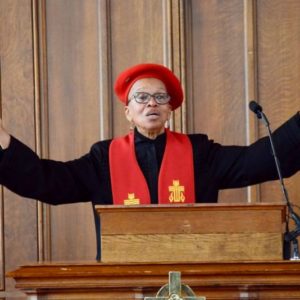
Rev. Veronica Thomas
“But the fruit of the Spirit is love, joy, peace, longsuffering, gentleness, goodness, faith, Meekness, temperance: against such there is no law” (Galatians 5:22 – KJV).
In the early eighties I truly began to seek God fully and “to become strong in Him and His might.” I asked Him to manifest the gifts of the Holy Spirit in my life. God told me that I could not have the gifts without the fruit. As I meditated on his response it became very clear to me what he meant. If I was given the gift of healing and did not have the fruit of longsuffering I would be unable to withstand God’s timeline, not mine, for complete healing. And if I was given the gift of interpretation of tongue and did not have the fruit of self-control, translating would be subject to my motives. I would be depending on the flesh, not the Holy Spirit. The gifts are not to be exercised except by fruit of the Spirit, which is love. Neither you nor I can exercise a gift of the Spirit without having the fruit of the spirit. Love is powerful. I Peter 4:8 declares, according to the Message Bible, “Most of all, love each other as if your life depended on it. Love makes up for practically anything.”
The Holy Spirit wants to produce fruit – it is called the fruit of the Spirit in God’s children (us). “The fruit of the spirit is love, joy, peace, longsuffering, gentleness, goodness, faithfulness, meekness, and self-control. Notice it is singular: is, not are. You can disagree with the grammar used here, however Professor Carson would argue, it happens to be singular in the Greek. This indicates that love is the fruit and from it stems all other fruits.
The fruit of the Spirit is love. Love never fails and if we substitute God for love, it reads God never fails. The fruit of the Spirit should characterize the lives of believers. That’s us. When I tell others if you belong to the true and living God, the fruit of the Spirit should be manifested in your lives. I am telling sometimes accused of judging them. I denounce that and declare God has given me permission to be a fruit inspector and I have the right to look at the fruit you are producing. And guess what? You have the same right to look at what fruit I am producing. There will be no oranges on an apple tree, no nectarines on a lemon tree. You get the idea! The fruit is produced in our lives by the Holy Spirit. Jesus wants to live His life through us. The fruit of the Spirit is the virtues of Jesus and if we are made in God’s image, we must demonstrate on show the fruit of the spirit in our daily lives.
The fruit of the spirit is love and love is manifested in eight characteristics of love. Joy is love’s strength, peace is love’s security, long-suffering is love’s patience, gentleness is love’s conduct, goodness is love’s character, faithfulness is love’s confidence, meekness is love’s humility and self-control is love’s victory. There is no other answer.
As we live out the “fruit of the spirit” God had a progression in mind when He inscribed these words. Love is the answer to all hurt, harm, and danger. Love produces joy (exuberance about life) and joy manifest peace (serenity) and peace will manifest longsuffering (a willingness to stick with things), longsuffering will manifest gentleness (how we handle ourselves), gentleness will manifest goodness (a sense of compassion in the heart), and goodness will manifest faithfulness (acting like God is telling the truth), then faithfulness manifests meekness (not needing to force our way in life) and meekness manifest self-control (able to direct our energies wisely). Men and women of God that’s living a Godly productive life.
The fruit of the spirit provides a road map for breaking the chains of racism. I challenge all of us who are reading the article to pursue a path of love manifested in joy, peace, longsuffering, gentleness, goodness, faithfulness, meekness and self- control, to include understanding and unity that reflects the transformative power of Galatians 5:22-23 that the fruit may grow in us. Amen. So be it.
Promoting CommUnity in Difficult Times
BY REV. DR. HELEN BESSENT BYRD
M.Div., Union-PSCE ’07; Ph.D., UConn
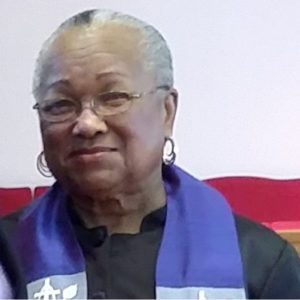
Rev. Dr. Helen Bessent Byrd
Ephesians 4:7-16
The Book of Ephesians was written in about year 70 of the Common Era primarily addressing the Gentiles who had become Christians. The Jews, people of Israel were insiders; the Gentiles, Greeks or Hellenists, were outsiders. Dissension and division were prevalent among them. The message is to believers in the church to get along with each other. So, this epistle and most especially Ephesians 4:7-16, focuses on promoting unity and building community to decrease the division in the body of Christ (the church). After all, there was to be unity in this diversity because God is the creator of all creation.
There are many different kinds of spiritual gifts – particular ways to share blessings with others. God has enough to go around to each of us. Foundational for us all should be humility, gentleness, patience and love. In the scripture cited above, there are four spiritual gifts cited: apostles who pioneered church growth, prophets who speak God’s words to particular circumstances, evangelists who are storytellers that share the gospel and bring people to Christ and pastors and teachers who care for and teach local congregations. Now friends, these gifts are not limited to any class and fit in no hierarchy. We should always remember that all our gifts come from God, we all have gifts, each of us has different gifts, and God wants and expects us to use our gifts.
The author of Ephesians tells us in verse 15 that we should serve until the whole body of Christ is built up so that we might achieve unity. Consonant with this message, the Book of Order espouses that the unity of the Church is a gift of the Lord and each congregation promises and covenants to live together in unity (BOO G-41.0201). Unity of all persons in each council should be evident. The General Assembly constitutes the bond of union, community, and mission among all its congregations and councils, to the end that the whole church becomes a community of faith, hope, love, and witness and keep before it the marks of the Church and the Six Great Ends of the (BOO G-3.0501).
So, let us be encouraged. Know that God has given each one of us a generous portion of all of these gifts and more. Even in this present time when there are some among us who are proponents of division based on race, class, ability, sex and sexual orientation, there is a preponderance of persons who have agency to give prophetic witness, audaciously speaking out and raising critical questions about moral and social issues in legislative, judicial and socio-political contexts. Many pastors as well as lay and ordained men and women of the church do boldly proclaim the Word of the Lord winning souls by God’s grace and leading in the governance of congregations.
Let us hold fast to the guidance that Elizabeth Taylor gave when she received an honorary Oscar for her work in fighting AIDS in 1993. She said, “I call on you to prove that we are a human race and that our love outweighs our need to hate, and that our compassion is more compelling than our need to blame.” I encourage you to continue the good work that you do showing love to all providing support for quality public school education, supporting health services for citizens and meeting needs of children and adults all across the world. Remember, “It is in loving, not in being loved that the heart finds its quest; it is in giving, not in getting that our lives are blest.”
Too often, we struggle to live in unity, dividing along the fault lines of our societies. Ruptures occur, occasionally of earthquake proportions.
Divisions occur in our families, among friends, in our particular churches, in our denominations, in our nations, and in our transglobal relations. Let us be leaders in tearing down the walls that divide us. We give thanks to God for leading us to empty ourselves of selfishness and giving ourselves to service like Jesus Christ. Unity to be real must stand the severest strain without breaking (Gandhi). Keep this belief about life: Life can’t give me joy and peace; it’s up to me to will it. Life just gives me time and space; it’s up to me to fill it.” Using your spiritual gifts and working together, we can achieve both unity and community while maintaining a wholesome respect for diversity. Thanks be to God! Finally, let us remember to give to UPSem so that others may have the rich quality experience that you had preparing to serve Christ and the church for the sake of the world.
My Book on the Rural Black Church
BY REV. DR. LEONARD EDLOE
Pharm.D. UFL ’03; M.Div. STVU ’99; Th.M UPSem ‘2018
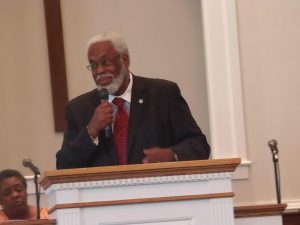
Rev. Dr. Leonard Edloe
In November of 2023, what started as a thesis in 2017 was finally published as the book: Restoring The Glory – Breathing New Life Into the Rural Black Church.
The thesis that resulted in the book was something that was not planned, but the result of several factors, the first being the proposed merger between The George W. Truett Theological Seminary in Waco, Texas and what is now Leland Seminary in Arlington, Virginia. I was teaching Christian Ethics at Leland without a terminal degree in theology. My doctorate is in pharmacy and for years I had authored articles on the conscious clause: the involvement of pharmacists in lethal injections and other ethical issues.
I entered Union Presbyterian Seminary in 2016 intending to study the Theology of Dr. Martin Luther King, Jr. In fact, I audited a course on the theology of Dr. King during the spring semester prior to enrolling. While taking that course, I encountered the work of Dr. Raphael Warnock: The Divided Mind of the Black Church, Theology, Piety and Public Witness. My focus started to turn to Personal Salvation and Social Christianity: Doing Ministry in the Real World.
The real world for me, however, was the Rural Black Church, where I had been serving for 20 years. My studies kept directing me to this institution that has survived despite the lack of many of the resources others take for granted. One day, as I went through one of Dr. Katie Cannon’s famed bibliographies, I discovered the title, Dark Glory, A Picture of the Church among Negroes in the Rural South, by Dr. Harry V. Richardson. At that time, I did not know that Dr. Richardson was one of Dr. Cannon’s professors when she was in seminary.
I begin my book talking about the strange journey of a city boy who grew up in the Methodist tradition and became the pastor of a Rural Black Church after years of serving in numerous roles, including Certified Lay Speaker, and then moving on to an Urban Mega Baptist Church, where I was licensed and ordained, and led several ministries. My next move was from United Methodist Church where Bishop Leontyne Kelly, a graduate of Union Presbyterian Seminary and the first African American Woman to serve as a Bishop in the United Methodist Church.
I have always felt the Church should take steps to improve the economic situations of their members and the communities they serve. I feel that I have taken solid steps to make that happen and have seen the results in many small ways.
My book is historical in several ways. It discusses the formation of the Rural Black Church, a church that exists because of location and racism. The book is historical because it draws from the work of Dr. John Malcus Ellison, the first African American president of Virginia Union University who authored an article on the Rural Negro Church in 1930 and also the book Dark Glory, A Picture of the Church Among Negroes in the Rural South by Dr. Harry V. Richardson, who founded the Interdenominational Theological Center in Atlanta. I then take on the task of defining the Rural Black Church. The fact that it is in many instances a Family Church. I examine the Pastor, officers and their power sharing followed descriptions of the organizations, ministries, the building and its content. I then engage the theology of the Rural Black Church that is in many instances personal piety. I also looked at past studies and their findings then devote a chapter on theo-ethical Issues facing the Rural Black Church. The issues I discuss are developed by answering the questions who/what/why that Dr. Cannon so often used as part of her pedagogy.
I included an article I authored as a student at the Samuel Dewitt Proctor School of Theology at Virginia Union University on whether the Black Church in general and the Rural Black Church in particular were either an impediment or instrument of black economic empowerment.
The next chapter discusses education in the Rural Black Church, both Christian Education and general education. In the appendix I include curriculum for the “Summer School on Sunday” Initiative that I teach at the Church where I serve as pastor.
I then deal with the challenges the Rural Black Church faces in the twenty-first century along with its relationships with seminaries and denominations.
The book closes with a chapter entitled, “Where Do We Go From Here” that examines the challenges, the use of technology, the need to reject patriarchy, theology, empowering the membership, serving the community, and the need to change the language spoken in the Rural Black Church.
I feel this book is historical because to my knowledge, it is the first book written on the Rural Black Church in over 70 years. I hope that it inspires others to examine the institution. I also pray that this book will be instructive to young seminarians who begin their ministry in a rural environment with which they are totally unfamiliar. Hopefully pastors, officers and members of the Rural Black Church will be inspired to bring about the necessary changes to Restore the Glory!








